Oct 22, 2025 – Religious Leaders’ Meeting, Weekly Dharma Assembly, Peace Research Seminar
Hello. Today is the day for the religious leaders’ meeting for national reconciliation and peace, and the Weekly Dharma Assembly where Jungto Society members examine their practice.
After completing his morning practice and meditation, Sunim headed to the Jungto Social and Cultural Center for the religious leaders’ meeting. When Sunim arrived, pastors, priests, bishops, and religious leaders from various faiths also arrived one by one at the basement dining hall.
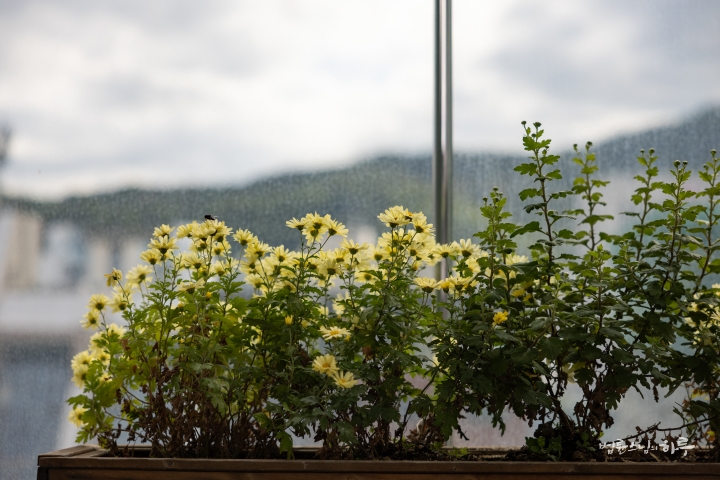
After having breakfast prepared with care by The Peace Foundation staff, they moved to The Peace Foundation conference room to continue their conversation.
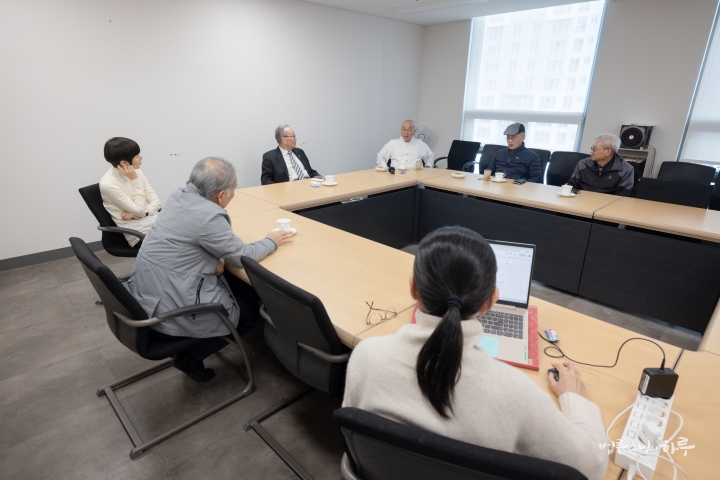
First, Sunim shared the results of his early October visit to Washington D.C. for peace on the Korean Peninsula, where he met with U.S. government, congressional, and think tank officials. They then discussed the prospects for a North Korea-U.S. summit during the upcoming APEC Summit in Gyeongju.
Finally, they freely discussed issues reported in the media over the past month regarding peace on the Korean Peninsula and national unity. The religious leaders expressed concern about the increasingly severe confrontation between the ruling and opposition parties. Sunim also shared his concerns.
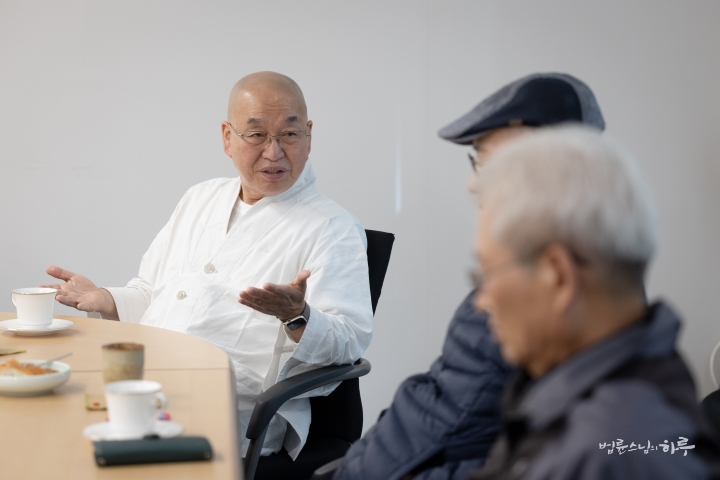
“Looking at the big picture, the key to our country’s development lies in how we solve several important challenges. How will we respond to President Trump’s tariff pressure policy? How will we manage the security crisis from the withdrawal and redeployment of U.S. forces in Korea? How will we protect our citizens from crimes targeting Koreans in Southeast Asian countries like Cambodia? These are representative examples. With such important issues piling up, the ruling and opposition parties cannot just engage in political strife and fight each other. Now is the time for cooperation, not political conflict.
Now Is Not the Time to Fight, but to Put Our Heads Together
For national development, we must embrace minor differences and boldly reach consensus on major goals. Without this perspective, national unity is difficult. Looking at the North Korea issue alone, if we nitpick everything saying ‘How can we talk with such a counterpart?’, dialogue becomes impossible. For the greater goal of peace, we must engage in dialogue with North Korea. The same applies to Japan. If we dwell on every past issue, cooperation is impossible, but to protect our national interests amid the U.S.-China hegemonic competition, we must cooperate with Japan where cooperation is needed.
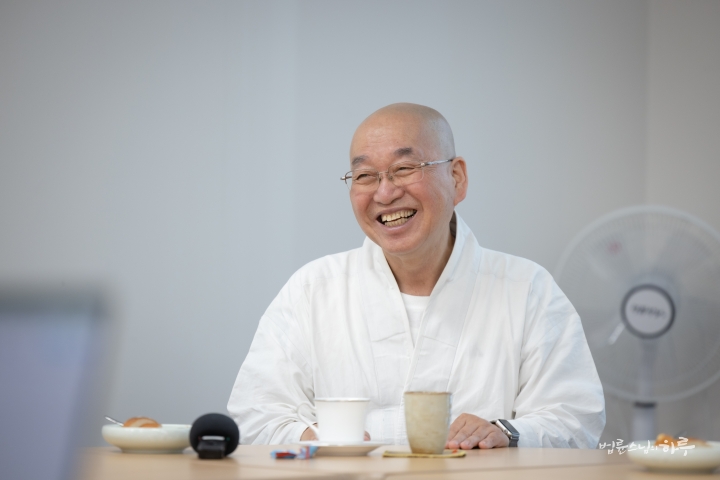
The same applies to domestic politics. While serious problems that must be corrected should be decisively eliminated, other minor issues should be set aside temporarily to move toward national unity so we can respond to national crises. However, the current reality is flowing in a direction that makes national unity more difficult, which is worrying. Only a small number of insurrection forces that must be corrected should be dealt with swiftly, but if we keep expanding the scope, we’ll only drag out the process. Eventually, it will appear to the public as mere political sparring, and the essence of the matter may fizzle out.”
The religious leaders each shared their opinions.
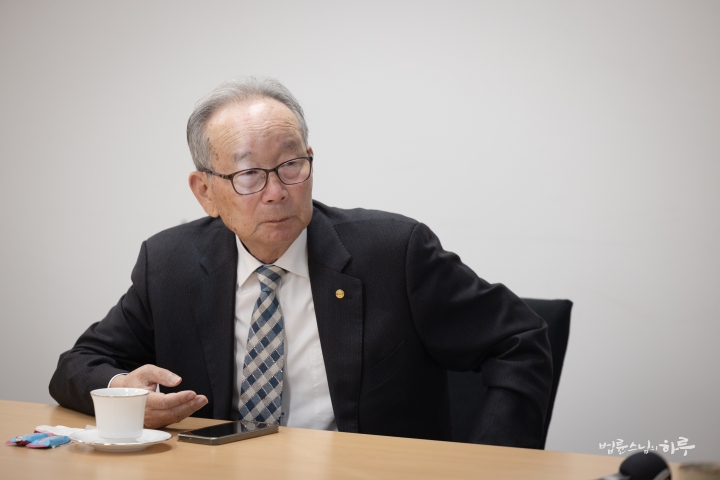
“While the public has been somewhat aware of the need for prosecutorial reform, I don’t think they knew the judiciary was this corrupt. I believe that not only prosecutorial reform but also judicial reform must be achieved.”
“But because the ruling and opposition parties are fighting so much, the original meaning of eliminating insurrection is becoming increasingly obscure, appearing only as political sparring, and the public seems to be feeling fatigued.”
“Politicians care more about winning party primaries than public opinion, so they have to watch their hardcore supporters, which creates a structure where they have no choice but to fight more.”
“If only a few were punished for insurrection, trials could proceed quickly, but as the targets expand to include prosecutors and the Supreme Court, trials are delayed and controversies over judicial independence are growing. I’m worried whether proper reform is possible under these circumstances. It might all fizzle out by next year’s local elections.”
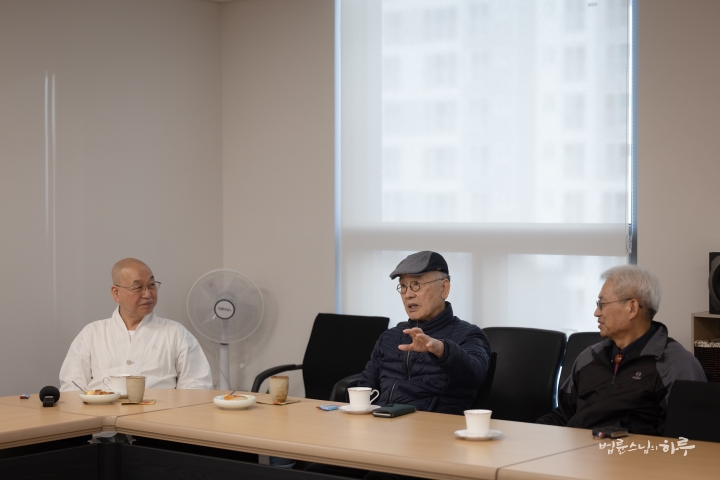
While the religious leaders generally agreed on the need for national unity, they had differing opinions on the scope and methods of eliminating insurrection. Therefore, they decided to watch how the confrontation between the ruling and opposition parties unfolds and whether meaningful contact between North Korea and the United States occurs during the upcoming APEC Summit, then continue more in-depth discussions next month.
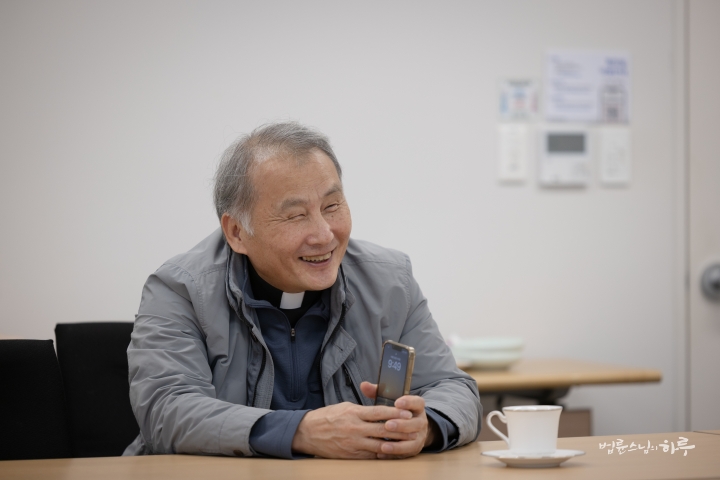
They concluded their conversation by agreeing to hold next month’s meeting in Yeongdong County, North Chungcheong Province, where Father Kim Hong-jin is farming.
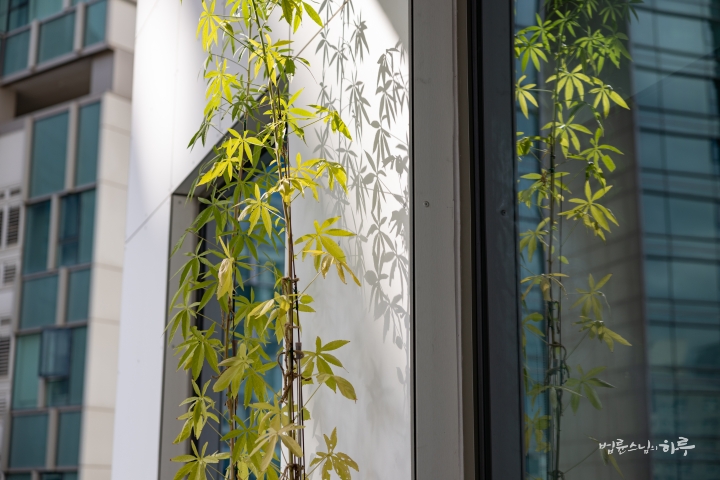
After seeing off the religious leaders, Sunim headed to the Dharma Hall on the third floor for the Weekly Dharma Assembly.
About 100 members of the Sangha had gathered in the Dharma Hall. At 10 AM, the Weekly Dharma Assembly began with the Three Refuges and Heart Sutra recitation. Jungto Society members participated online by connecting to the video conference room.
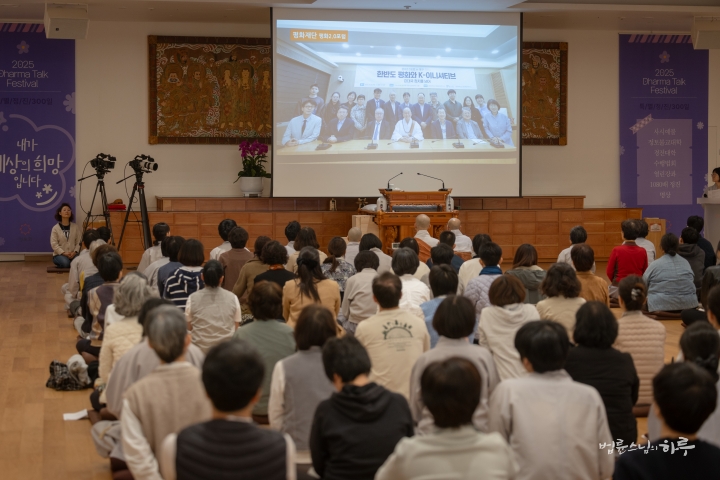
After watching a video of weekly Jungto practitioner news, the assembled members requested a Dharma talk from Sunim with three prostrations. First, Sunim gave his greeting.
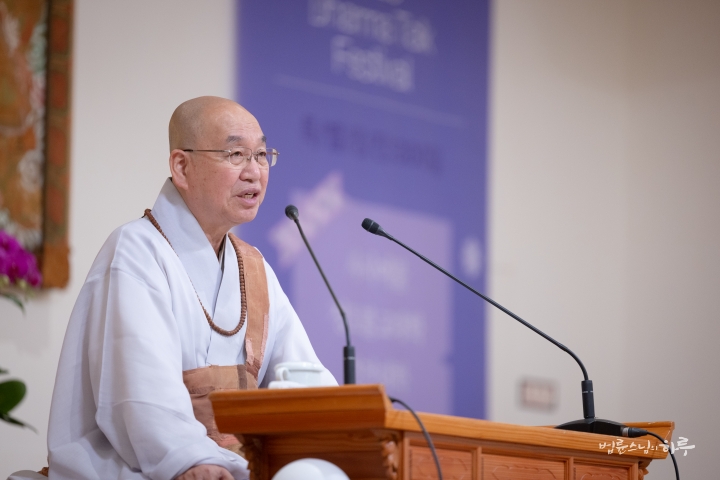
“The temperature has suddenly dropped and the weather has become quite chilly. It feels as if we’re skipping autumn and going straight from summer to winter. Year by year, autumn on the Korean Peninsula is getting shorter as the climate changes. It seems to be moving away before we can fully experience it. While the rice in the fields has ripened yellow, frequent rains have prevented the harvest. This year, with no typhoons and generally mild weather, a good harvest was expected, but with continuous rain during harvest time, there are concerns that the rice may sprout and reduce yields. Still, thanks to the approaching autumn, the air has become clearer and our minds feel sharper.
Please be careful not to catch a cold during this change of seasons. There’s an old saying: ‘If you shiver at the first cold, you’ll shiver all winter.’ Keep your body warm during the first cold and take good care of your health. Since last week, Jungto Society has entered the semi-annual retreat period. You’re all practicing diligently every day, aren’t you?”
“Yes.”
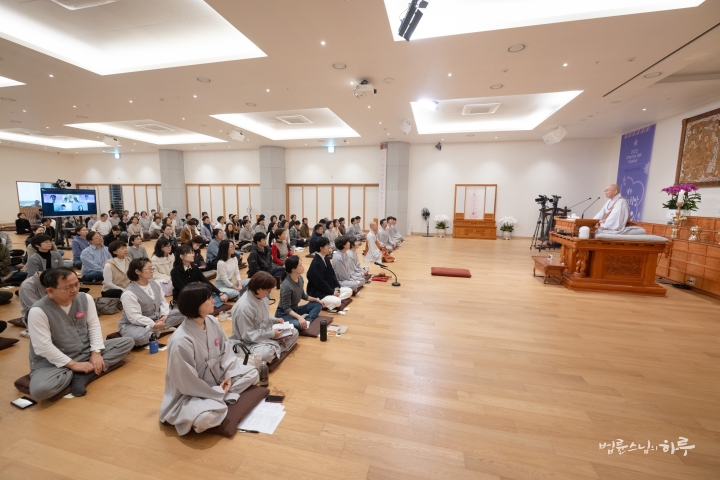
“A week has already passed. I hope you’ll continue your practice steadily this week as well. October has only about ten days left. The most important matter we should keep in our hearts and pray earnestly for over the next ten days is that the Asia-Pacific Economic Cooperation (APEC) Summit in Gyeongju proceeds smoothly and bears good fruit.
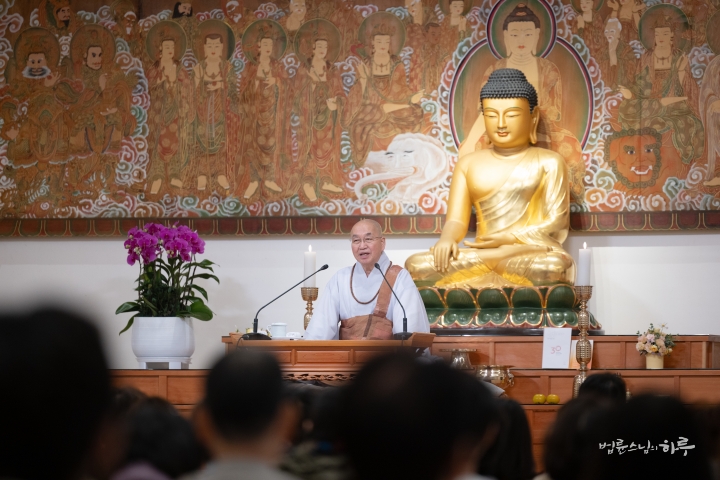
Praying for the APEC Summit to Become a New Turning Point for Peace on the Korean Peninsula
While the APEC Summit is a national event, the greatest interest in this meeting actually lies not in the APEC main conference itself, but in whether President Trump and Chairman Kim Jong-un will have a surprise meeting. Although it may seem like a simple event, if such a meeting were to take place, it could serve as an opportunity to open channels for dialogue between North Korea and the United States, which could then develop into inter-Korean dialogue and become a major turning point for establishing peace on the Korean Peninsula.
Let us gather our earnest wishes and pray for the day when there will be no more war on the Korean Peninsula and peace will take root. If human power alone is not enough, let us combine the grace of God, Buddha, Bodhisattvas, and our ancestors to ensure that our wishes come true. Of course, if the meeting doesn’t happen, it won’t cause major problems, but if it does, peace on the Korean Peninsula will come that much sooner.”
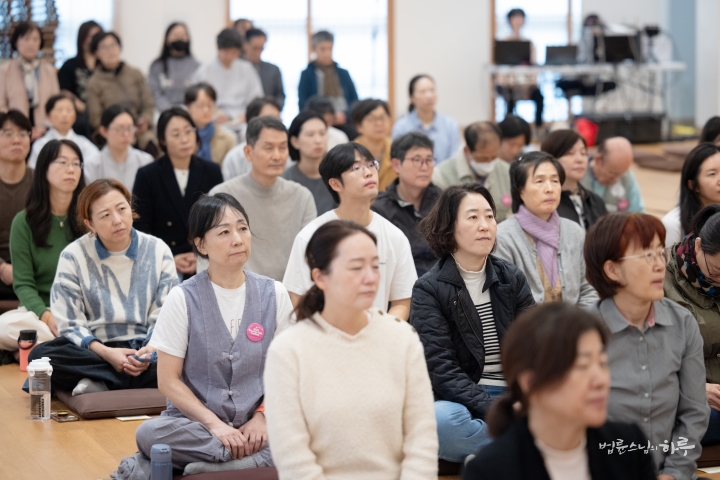
Following this, Sunim took questions from those who had submitted them in advance. After one person asked a question online, another person raised their hand and asked a question from the audience. One of them shared that whenever she discusses politics with her college-aged son around election time, they always clash, and asked Sunim for advice on how to maintain a balanced perspective despite their differing views.
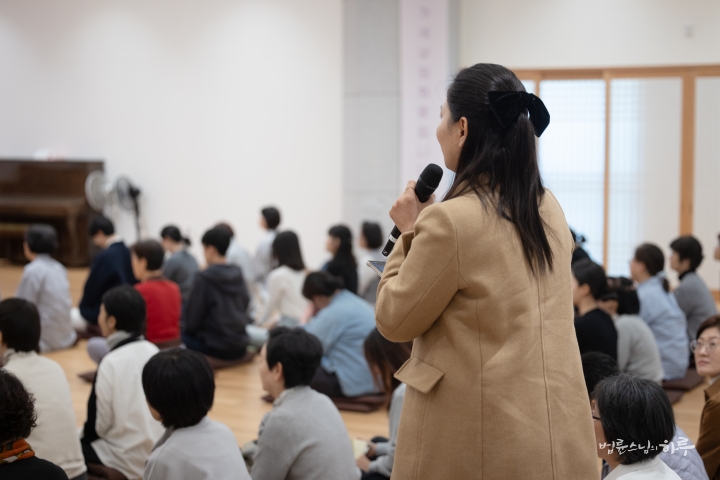
My Son and I Clash Whenever We Talk About Politics. How Can We Communicate Better?
“Looking at statistics on political tendencies, when we generally divide people into progressive and conservative, the most conservative age group is those in their 70s and above. You might think the 60s would be next, but actually, men in their 20s are the second most conservative. Third is those in their 60s, and fourth is men in their 30s.
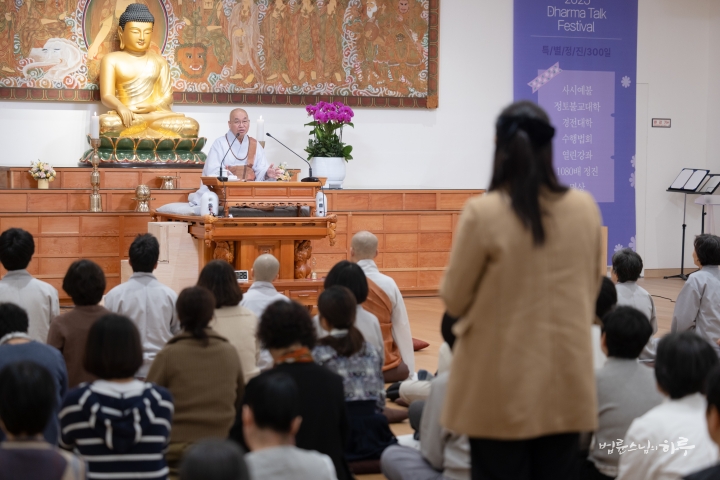
On the other hand, among the progressive demographic, men and women in their 40s show the highest percentage at about 75 percent. That means three out of four people in this age group are progressive. Men and women in their 50s show similar ratios. Next come women in their 30s, followed by women in their 20s. However, recently, women in their 20s have also been gradually shifting toward conservative views. If you are in your late 40s or 50s, you belong to the most progressive generation, while your son, being in his 20s, belongs to the most conservative generation. In other words, your son has political views similar to those of grandfathers in their 70s and 80s. So the difference of opinion between mother and son is quite natural.
As time passes, generations naturally move up in age. In the past, people in their 60s were very conservative, but now those in their 60s show similar ratios of progressive and conservative views. Those who were progressive in their 30s have now moved to a more moderate position. This is because those who were in their 50s back then are now in their 60s, and those who were in their 20s are now in their 30s.
These changes didn’t occur because of any special political education, but rather reflect the overall flow of society. That’s why the parent generation in their 50s is progressive while the children’s generation in their 20s is conservative, leading to conflicting views. So it’s natural, in a way, that they clash.
Just 20 years ago, those who are now in their 40s and 50s were the younger generation. Back then, communication with the parent generation was completely impossible. There was even a saying at one time: “I’ll vote early and take my parents on a trip on election day.” It was a joke suggesting that the parent generation was so conservative that they should be prevented from voting altogether. This shows how significant the political differences between generations were.
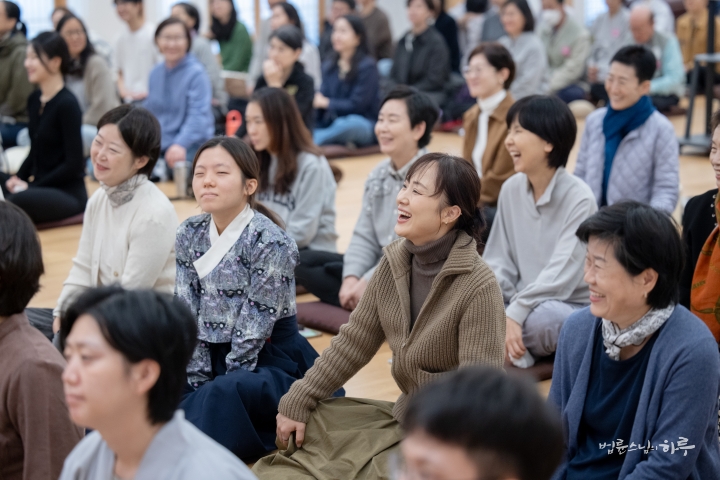
Now the opposite phenomenon is occurring. The younger generation inherently feels a certain sense of oppression from the parent generation, leading to an instinctive rebelliousness. So when parents were conservative, children tended to be progressive, and now that parents have become progressive, children are showing a tendency to lean conservative again.
This phenomenon is particularly pronounced among men. The reason is that men in their 20s have accumulated significant grievances. They didn’t receive any special privileges compared to daughters while growing up, yet girls often performed better academically in school. In society, they may face disadvantages in dating and gender-related issues. They have mandatory military service obligations, and in the workplace, despite claims of “gender equality,” men are often expected to work overtime. As these various factors compound, resentment builds up and influences their political leanings.
In the United States, there’s a noticeable rightward shift among white men, and analyses suggest their psychological structure is very similar to that of Korean men in their 20s. Interestingly, in the U.S., the rightward shift of white men has created a bandwagon effect extending to white women and men of color, expanding Trump’s support base. Similarly in Korea, we’re seeing a “conformity phenomenon” where conservative tendencies among women in their 20s are gradually increasing. These changes aren’t the result of political education but rather a reflection of social atmosphere. When society tilts in one direction, people naturally gravitate that way.
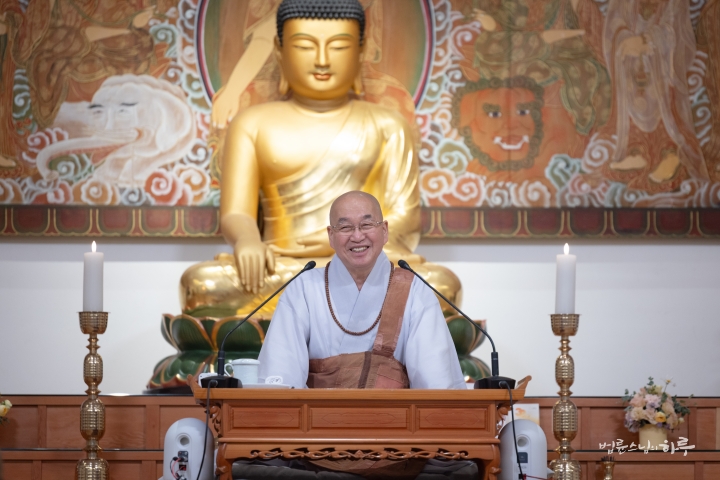
Additionally, people have an instinctive tendency to associate with those who are similar to them. This is evident in schools, society, and even online spaces. For example, if a man in his 20s repeatedly watches YouTube channels he prefers, similar content continues to be recommended. If you watch a video about “election fraud conspiracy theories” once, content on the same topic will endlessly follow. This creates the illusion that “this must be true.” In this way, YouTube’s algorithm further reinforces specific political leanings.
Ultimately, the parent generation and the child generation end up living in completely different YouTube worlds. When people only watch YouTube without watching public broadcasting news, it feels as if they’re living in entirely different worlds despite being in the same country. This is causing opinions across society to become extremely polarized.
Regarding court rulings, when the verdict favors their side, people say “justice is alive in the judiciary,” but when it’s unfavorable, they claim “the judiciary is dead.” They even attack judges’ personal lives to discredit the rulings themselves. However, this partisan logic only creates fatigue among moderates. This is also why you find it difficult to understand your son’s thinking.
That’s why your suggestion to watch the same public broadcasting together instead of different YouTube channels was really well done. It’s best to primarily watch news from public broadcasting. Public broadcasting goes through verification procedures before reporting. Since they face sanctions from the Press Arbitration Commission for false reporting, they are relatively trustworthy. On the other hand, YouTube contains many personal claims and speculations. While some may be true, many lack sufficient evidence.
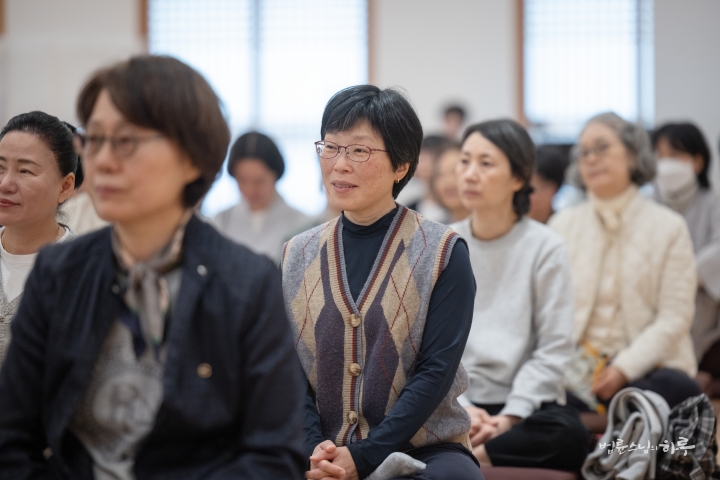
Of course, public broadcasting is not perfect either. While it is based on fact-checking, differences in interpretation do exist. That’s why watching one neutral news source and comparing it with both conservative and progressive media outlets can help you maintain a balanced perspective.
The same applies when watching foreign news. Since outlets like The New York Times, The Washington Post, Fox News, BBC, and AP have different perspectives and levels of credibility, it’s important to verify their sources. Since we can’t watch news all day, it’s good to focus on one channel while comparing coverage of major issues across multiple channels.
For example, if YouTube reports that “President Trump and Chairman Kim Jong-un are meeting at Panmunjom” but public broadcasting doesn’t cover it, it’s likely fake news. While public broadcasting may mention rumors, they won’t cover them in detail without evidence. Rumors should only be taken as “interesting trends” for reference.
Even public broadcasting can be biased when it comes to news about North Korea or Russia-Ukraine relations. This is because most reports cite American news agencies. North Korean news coverage is particularly distorted. Since media outlets have almost no access to actual information from inside North Korea, much of the content differs from objective facts.
That’s why when watching the news, you should always examine “from what perspective is this being reported?” and “what is the evidence?” It’s important to understand why the other side makes certain claims and what evidence or data they base their arguments on. The mindset that “everything my side says is right” is dangerous. We need to think first about the interests of the nation and all its citizens, and consider what is needed for the greater good.
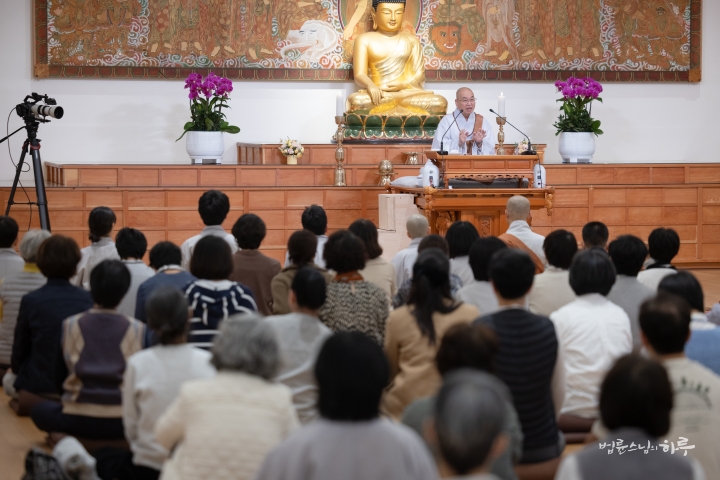
Jungto Society views the world from three perspectives. First, we value peace, believing there should never be another war on the Korean Peninsula. Second, we must create a social system of mutual prosperity where citizens cooperate rather than antagonize each other. Third, we must make efforts to alleviate the suffering of our North Korean compatriots so they can live dignified lives as soon as possible. As members of Jungto Society, we should view the world from these perspectives.”
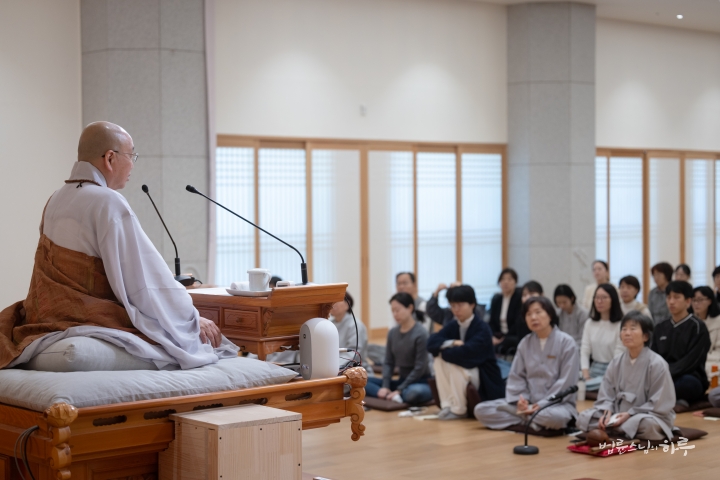
“Hearing that it’s natural to have different political views from my 20-year-old son has put my mind at ease. From now on, I’ll approach conversations with my son with a more open mind. I’ll also constantly examine whether my own thoughts are biased to one side. Thank you.”
“You don’t necessarily need to share the same views as your son. Having different positions is perfectly natural. While it might be more comfortable when family members living together have similar opinions, they don’t have to be identical. What’s important is recognizing that even after sharing sufficient information, people can still have different views.
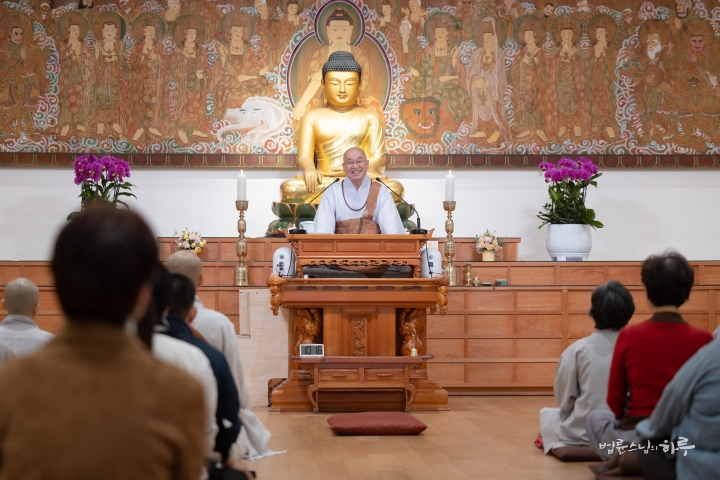
We can live together despite different views, and cooperate despite different faiths. We can coexist despite differences in nationality, race, or thoughts. However, when we need to discuss issues together, we need to make efforts to share sufficient information and narrow our differences through dialogue. But the obsession that ‘we must be the same’ becomes another source of conflict. The attitude of being able to cooperate while acknowledging our differences – that is true peace.”
After receiving one more question, it was time to conclude the Dharma assembly. After watching a video about various upcoming Jungto Society events scheduled for next week, the Weekly Dharma Assembly concluded with the Four Great Vows.
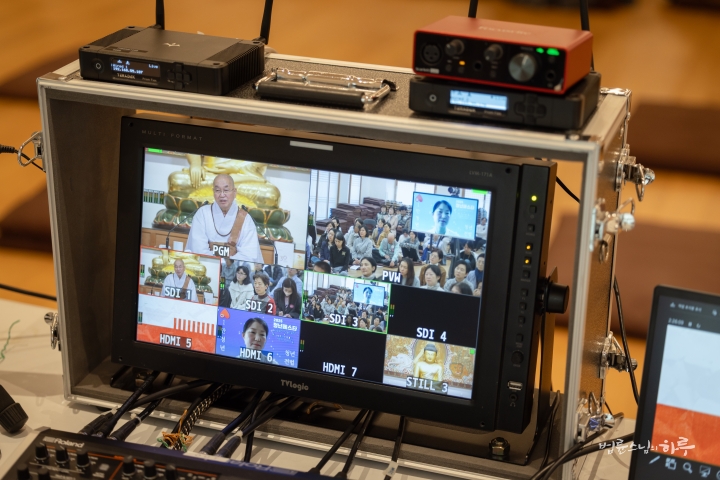
After lunch, from 1 PM, Sunim attended a Peace Foundation research seminar held in the Peace Foundation conference room on the topic of ‘AI and Human Mental Health.’
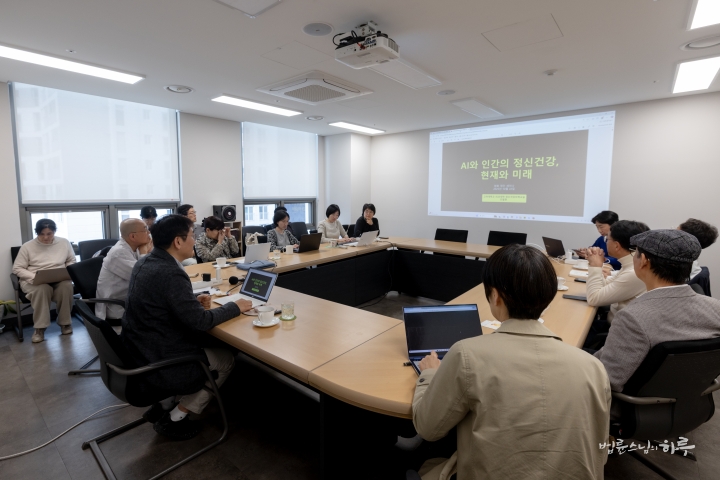
In today’s seminar, Professor Cho Chul-hyun from the Department of Psychiatry at Korea University Anam Hospital gave an in-depth two-hour presentation on the therapeutic innovations and ethical risks that artificial intelligence will bring to psychiatry, as well as the possibilities for collaboration with human therapists.
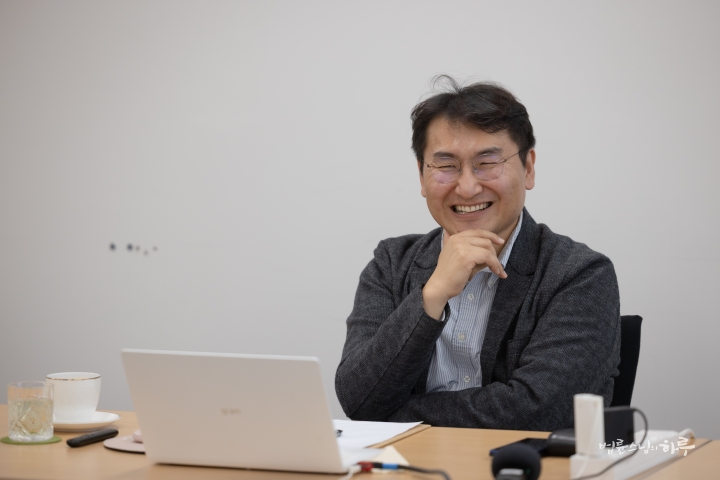
Professor Cho first introduced his ongoing research, then continued with a full presentation on AI and human mental health.
“In the first part, I briefly introduced what research I’m conducting and how digital technology can be integrated into psychiatric research. Today, I hope this will be a time for us to think together rather than finding definitive answers. I was very impressed that the Peace Foundation is addressing this topic in such depth.”
Professor Cho pointed out that as industrialization and technological development intensify, human mental health faces greater crises. He noted that Korea still records the highest suicide rate among OECD countries, and people suffering from mental difficulties face a reality where accessing treatment is difficult. He then mentioned recent changes in hospital wards. While adult schizophrenia patients used to be the majority, the age of hospitalized patients has dropped dramatically, with many now in their teens and twenties. He expressed concern that self-harm cases have increased to disaster levels, and adolescents’ mental suffering is intensifying both inside and outside hospitals.
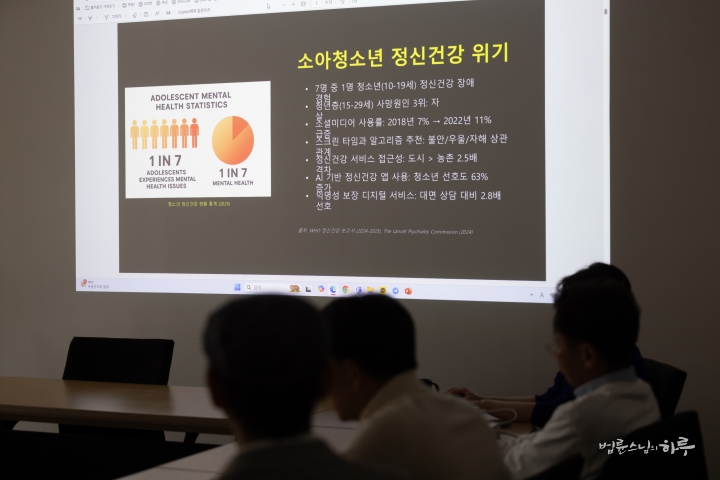
Professor Cho analyzed that while the causes of these changes cannot be attributed to a single factor, the influence of digital environments such as SNS and algorithm-based video platforms is significant. He also pointed out that even when technology is designed with good intentions, it risks reinforcing distorted cognition in psychologically vulnerable people. He mentioned that cases are increasing where some patients ask ChatGPT about their symptoms before visiting a psychiatrist, or trust ChatGPT’s answers more than a doctor’s judgment.
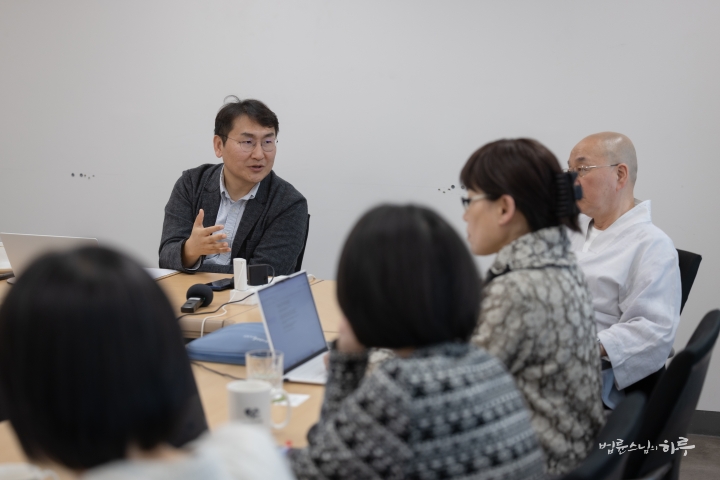
Professor Cho then carefully examined the clinical effects and limitations of AI. He explained that while generative AI-based counseling chatbots have shown some effectiveness for mild to moderate patients in certain studies, they have clear limitations for severe mental illnesses like schizophrenia or bipolar disorder. He also emphasized that what’s important in counseling is trust and empathy between counselor and client, and this ‘connection of hearts’ remains a unique strength of human counselors. He added that more research and discussion are needed on how much such relationships can be formed through non-face-to-face or app-based counseling.
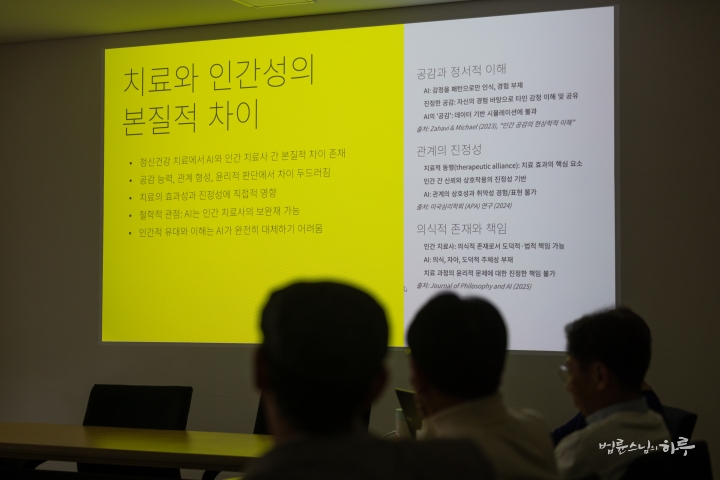
“To summarize, AI has both uses and limitations from a psychiatric perspective. Those limitations are now appearing sporadically as various issues. We stand before such a period of change. While we need to verify effectiveness through research, the limitations are still clear. It’s effective for mild cases but can be dangerous for severe ones, and ethical issues like algorithmic bias and privacy protection follow. Some issues will be resolved over time, while others will become more problematic.
I don’t think we need to insist on the traditional form of therapist. Eventually, a tripartite model of human-AI-client is likely to become standard. We need to consider how to establish each party’s role. Since problems including value confusion are expected not only in psychiatry but in various fields, experts from different areas need to work together to explore directions from philosophical, ethical, social, and religious perspectives. I’ll conclude with these thoughts.”
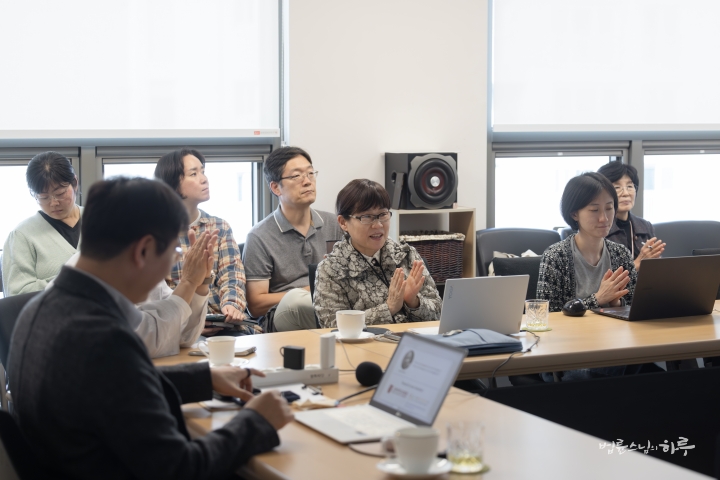
During the Q&A session following the lecture, conversations covered various topics. Many questions were raised, including: basic classifications and symptom differences of mental illnesses; criteria for distinguishing major conditions like depression, anxiety disorders, panic disorder, and schizophrenia; the impact of digital environments on mental health; the effects of AI and humanoid robot development on mental health; issues of bereavement and funerals with robots; the possibility of AI developing self-awareness; the extent of mental health research in North Korea; and privacy protection issues with AI data.
Sunim particularly emphasized the importance of early detection and treatment of mental illnesses and shared several questions and opinions with Professor Cho.
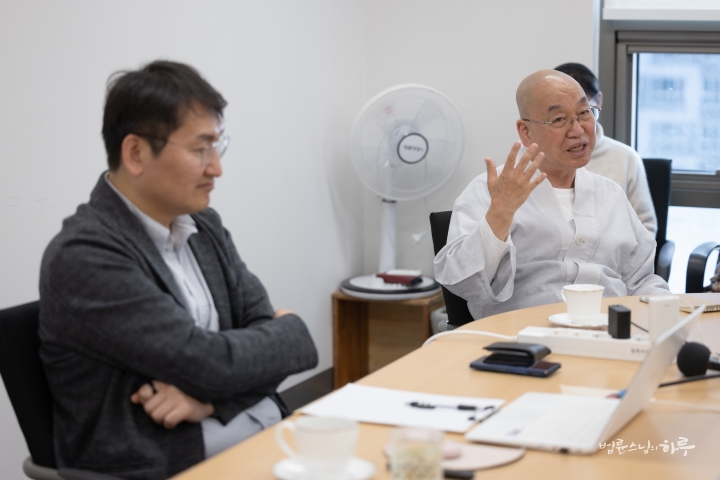
Why Do Schools Have Nutritionists but Not Psychological Counselors?
“While nutritionists and nurses are stationed at schools and health centers for physical health, there’s almost no system for mental health care. Many schools don’t even have one properly assigned counselor. However, mental illness is something that needs to be detected and addressed early, like a cold. Our society only begins to pay attention when symptoms become so severe that people wonder if someone has ‘gone crazy.’ By then it’s already too late – the illness becomes chronic and treatment becomes difficult. That’s why I’m proposing to the government that every school should have at least one psychiatrist, or at minimum a psychological counselor.
Another problem lies in the structure where homeroom teachers must directly manage students’ mental difficulties. When a student is suspected of having mental problems, parents react sensitively, fearing disadvantages in school records. However, if we establish a system where specialists are dedicated to counseling students or connecting them to hospitals, these issues would naturally be resolved. Furthermore, if we could station mental health personnel at administrative welfare centers or health centers to detect and treat residents’ mental illnesses early, it would greatly help reduce Korea’s high suicide rate.
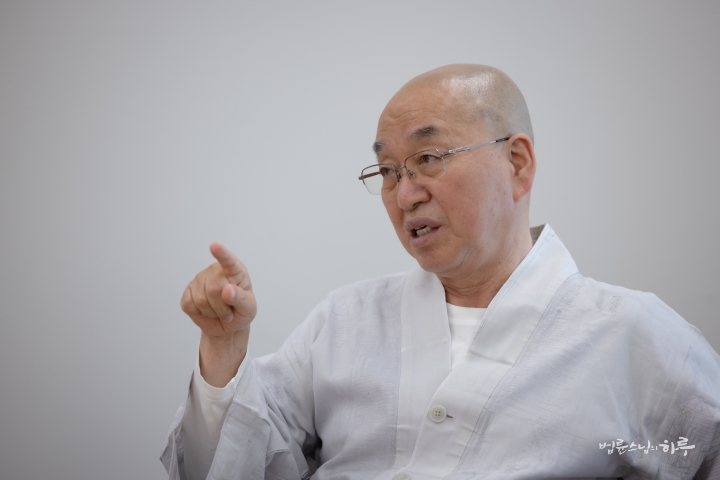
The problem is that reality doesn’t work this way. Even when hospitals have psychiatrists, it’s rare to find counselors working alongside them. As a result, psychiatrists end up just prescribing medication and calling it done, while counselors drag out problems that could be sufficiently resolved with medication through months of counseling sessions. When this happens, proper treatment becomes difficult to achieve. While the absolute shortage of personnel is one cause, institutional improvements are urgently needed at this point.”
Professor Cho actively agreed with Sunim’s thoughts and said:
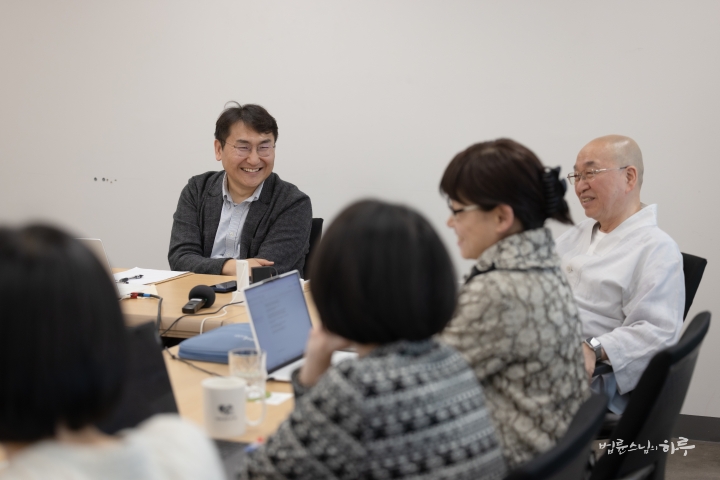
“Sunim is right. As an aside, I heard that a certain large corporation has at least one psychiatrist at every workplace and employs multiple psychological counselors. They do this because they see it as beneficial to the company. And it actually does have that much effect. We need this kind of system throughout society as a whole.”
Sunim continued to share his opinions, and Professor Cho added his thoughts, as they continued their discussion.
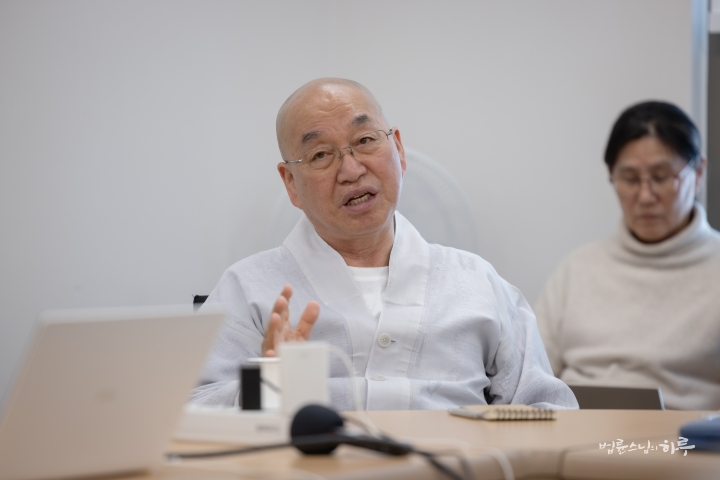
Schools Playing ‘Hot Potato’ with Problem Students – Is There No Solution?
“In my opinion, it would be more rational to organize classes based on students’ IQ and mental health status. While general students could be assigned about thirty per class, students needing intensive management should be reduced to fifteen or fewer, and students requiring special help should be grouped in small numbers with multiple teachers assigned. But right now, we’re doing the opposite. The current approach is to mix one or two difficult students into each class. In the end, teachers are essentially playing ‘hot potato,’ sharing the burden among themselves. That’s why being a first-grade homeroom teacher is said to be the hardest. From second grade on, students needing management are somewhat identified and can be distributed, but with newly enrolled first graders, there’s no information at all. So when students needing management end up concentrated in one class, the teacher really struggles.
The fundamental cause of these problems ultimately lies in the absolute shortage of doctors and counseling professionals. Compared to the rapid increase in mental health patients, the number of psychiatrists graduating from medical schools is woefully inadequate. In fact, even without going all the way to treatment, just early detection and referral to hospitals can have significant effects.”
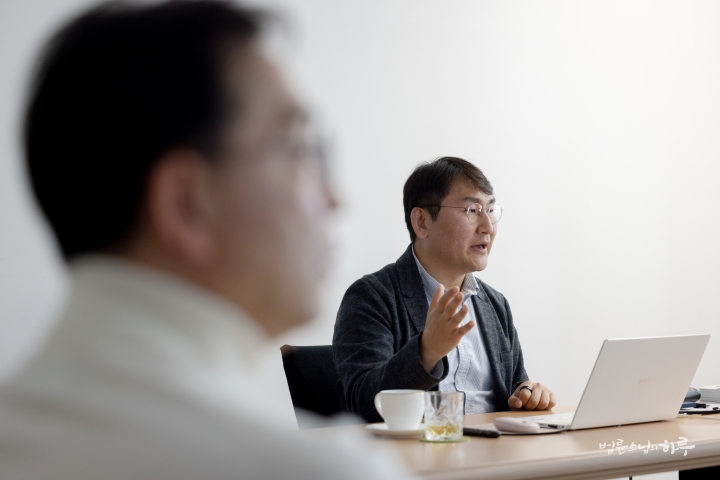
“As you mentioned, if professional personnel with a certain level of competence are deployed to each site, it will certainly be effective. However, schools require more dedication. It’s not just about having a certificate. To properly function in a school setting, additional educational courses or certification procedures are necessary.
The fundamental problem is that the medical delivery system has collapsed. In our society, when someone identifies a person with mental illness, that person bears all the responsibility. Otherwise, they are seen as someone who hasn’t fulfilled their social responsibility. However, this culture is unhealthy. We need a continuous system where, after fulfilling a certain role, one can naturally hand over to other professionals or institutions. This way, each person’s fatigue is reduced, and their role becomes clearer.
Even in hospitals, counselors alone cannot fully understand patients. Internships or clinical experience must be combined to understand the patient’s actual condition. Many cases that could have been easily treated if they had come to the hospital early end up worsening because they only received counseling. To prevent such problems, we need a structure where each professional clearly knows their role and can cooperate.”
As the professor calmly explained, Sunim nodded and spoke again.
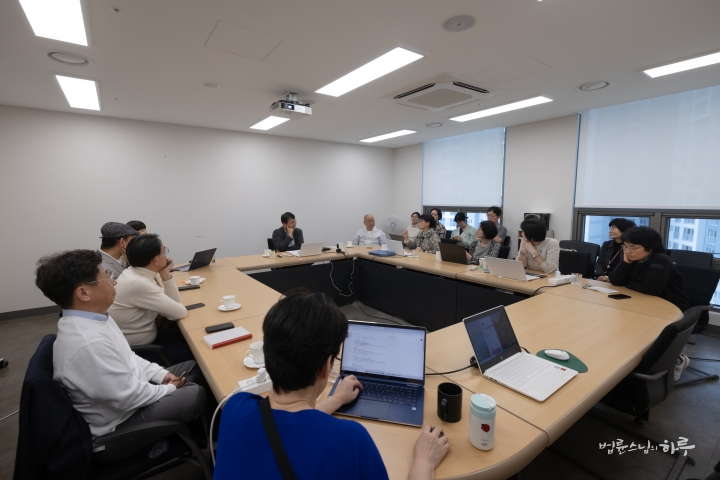
“Ultimately, the core issue is social consciousness. Parents are reluctant to take their children to hospitals, and even when they do, they try to avoid medication prescriptions. In fact, compared to the number of depression patients in our country, antidepressant consumption is less than half that of other countries. This becomes a factor in worsening the illness. On the other hand, there’s a distorted phenomenon where ADHD medications are excessively used for academic performance. This imbalanced perception is regrettable.
Our society has been imitating for the past 100 years. When problems arose, the solutions were already in the West. So we just had to imitate. But the problems we’re experiencing now are occurring almost simultaneously with the West. The same goes for mental problems caused by smartphones and SNS. However, we still lack experience in experimenting with these problems, accumulating data, and creating response systems. We can’t follow Western examples as we did in the past.
This is indeed the biggest challenge we face now. While advanced European countries have been finding solutions while experiencing new problems, we lack such experience and have no choice but to learn through trial and error. We don’t even have data on what side effects occur when children become addicted to smartphones and SNS, or how it affects the brain. We remain at the level of just being ‘worried.’ In the West, policies are made based on such concerns alone, but we only move when concrete evidence is presented. Also, we only implement things when there are foreign cases, especially American precedents. With this attitude, it’s difficult to properly respond to upcoming side effects. This will become a major problem in the future.”
The presentation and discussion continued for three hours. At nearly 4 PM, everyone took a commemorative photo together and concluded the seminar.
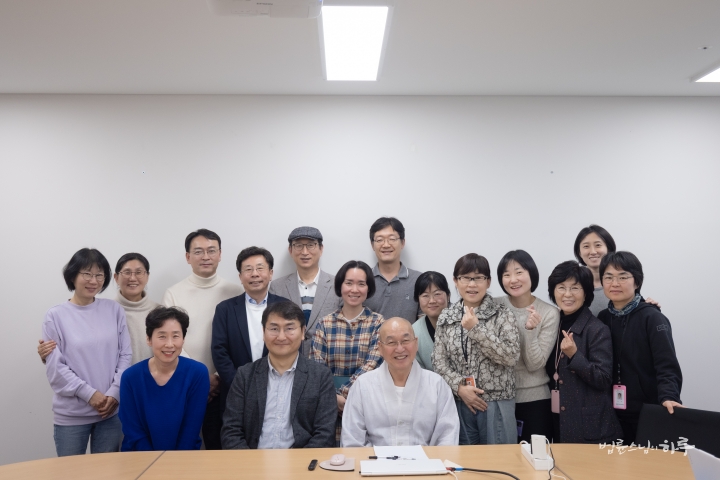
After expressing his gratitude to Professor Cho Chul-hyun, Sunim immediately attended the Peace Foundation Planning Committee meeting. For two hours, they discussed various perspectives on the possibility of a North Korea-US summit at the Gyeongju APEC Summit, the subsequent Korean Peninsula situation, and the role of the Peace Foundation within it.
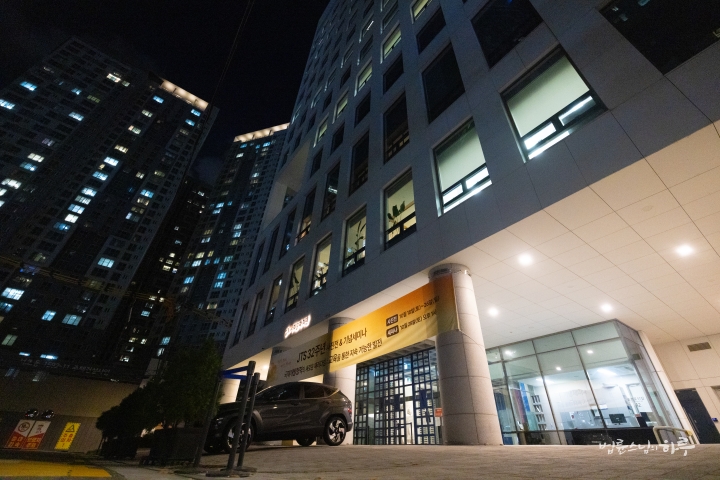
As the sun set, at 7:30 PM, Sunim conducted the evening Weekly Dharma Assembly live broadcast. About 80 people gathered in the third-floor Dharma Hall, while Jungto Society members connected through online video conferencing.
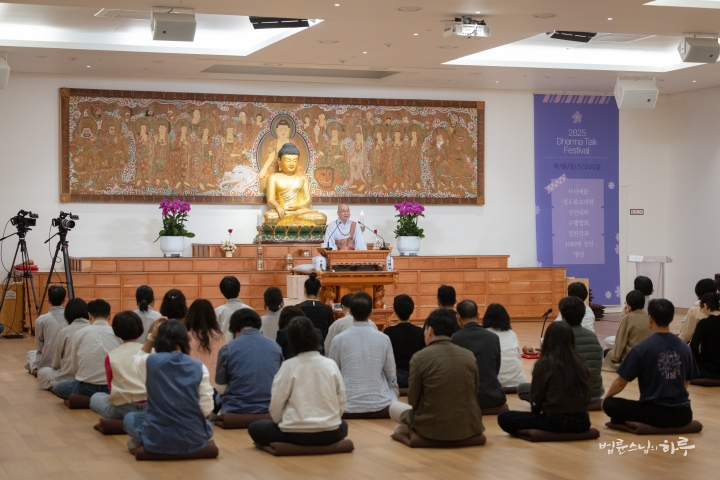
Female INEB participants from Southeast Asia observed the evening assembly as part of their Jungto Society tour program.
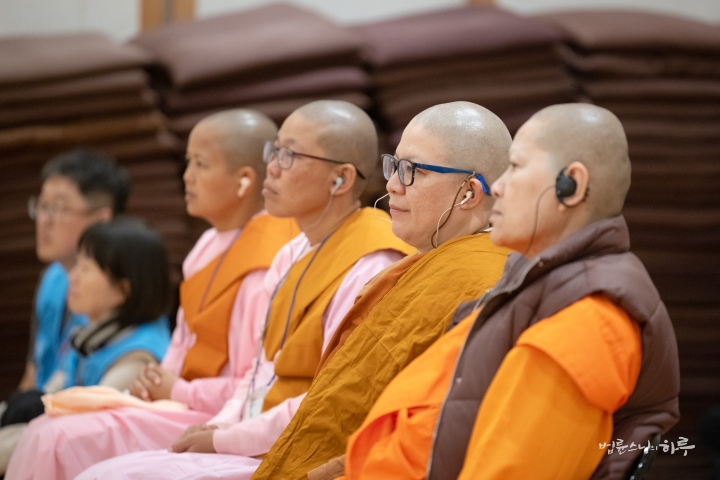
After watching the weekly Jungto practitioners’ news video together, the assembly requested a Dharma talk from Sunim with three bows. Sunim shared news of the deepening autumn and urged Jungto Society members to actively promote the upcoming Youth Festa so that many young people in Korea could participate, then began the dialogue.
Four people asked Sunim questions during the one-hour session. One of them, diagnosed with stage 3 breast cancer and undergoing treatment, asked for Sunim’s advice on how to understand her feelings of both being “fortunate that the cancer was discovered” while also experiencing tears.
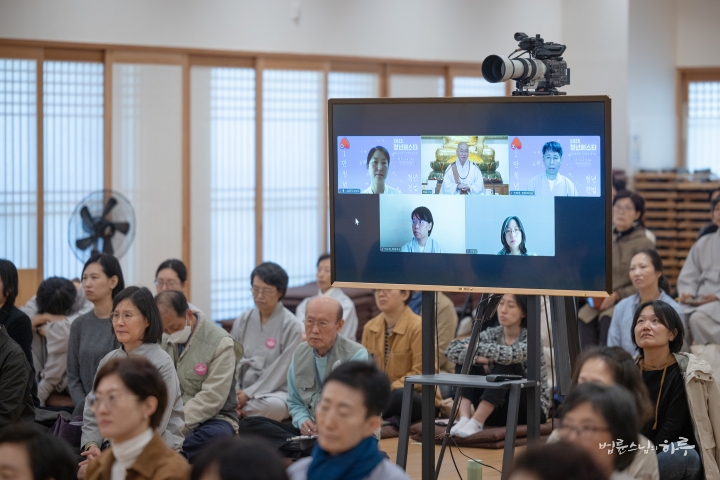
I Keep Crying After Being Diagnosed with Stage 3 Breast Cancer
“It’s difficult to say you’re deceiving yourself. Your heart feels depressed, but your mind is saying, ‘It’s okay, it’s good.’ That’s why your heart suddenly wells up. The attitude of trying to think positively certainly helps. Just as we think ‘I should take care of my parents,’ but feel uncomfortable with their nagging when we’re actually with them, our thoughts and feelings don’t always align. We rationally console ourselves thinking ‘I should still be filial,’ but emotions move separately. Similarly, like thinking ‘I should pray’ in the morning while feeling ‘I don’t want to get up,’ when thoughts and feelings diverge, it can feel like you’re deceiving yourself.
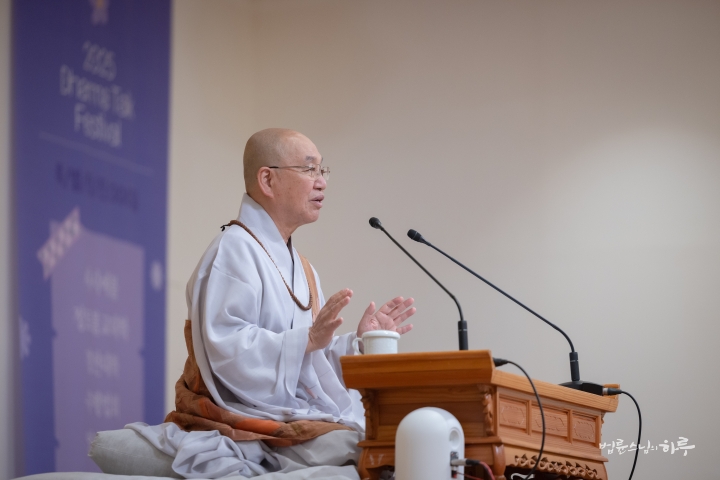
Heart and mind are often different. Ethics, morality, ideology, and beliefs all belong to thought, while ‘wanting to do’ or ‘not wanting to do,’ ‘feeling sad,’ or ‘suffering’ belong to the heart. The heart reacts immediately when situations arise, while thought reasons rationally. The heart is closer to emotion and feeling, while thought is reason and contemplation. That’s why in mental functioning, heart and mind operate in different ways.
When we don’t know our own hearts, we often say ‘I’m deceiving myself.’ What Buddha’s teaching calls ‘awareness’ is precisely ‘being aware of the state of one’s heart.’ You know the sadness in your heart and are trying to overcome it by consoling yourself with thoughts. ‘It’s okay. I have money for hospital bills, it’s fortunate I got it while young.’ While you comfort the fear of death with thoughts like ‘When I die, I’ll go to heaven’ or ‘There’s reincarnation, so no need to worry,’ the actual fear and sadness you feel come from the heart.
Buddha’s teaching is that when you realize the truth, these fears disappear. This is called Nirvana, a state without suffering. We must face reality directly. It would have been better not to have cancer, but you already have it. Even thinking ‘I wish I hadn’t gotten it’ won’t make the disease disappear. For example, if you fall down the stairs and break your leg, thinking ‘I wish I hadn’t fallen’ doesn’t help. If your leg is already broken, you need to go to the hospital for treatment, wear a cast, and walk with a limp. Cancer is the same. If you already have it, you just need to receive modern medical treatment at the hospital.
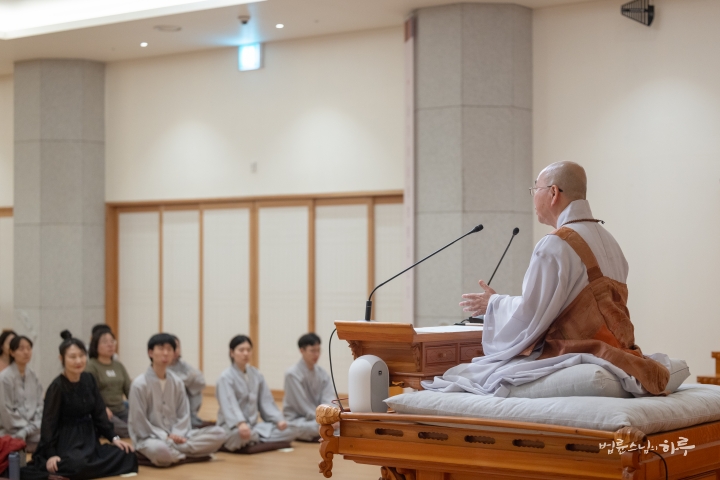
You have two options. One is to live naturally without treatment, and the other is to receive treatment. If you need treatment but don’t have money, you’ll worry, but fortunately, if you have the funds for treatment, you’ll have less to worry about. Also, if you have money but lack medical technology, that would be a problem, but our country has advanced medical technology, which is something to be grateful for.
Stage 1 or 2 cancer is mainly treated with surgery. In very early stages, many cases can be completely cured with radiation therapy alone. If, like you, the cancer is at stage 3 and surgery is difficult, chemotherapy may be used to shrink the tumor before proceeding with surgery. This decision is for the doctor to make. With stage 3 cancer, the cure rate is somewhat lower. These days, stage 1 or 2 cancer is hardly considered a serious illness, but if it has already spread to surrounding areas, the cure rate is less than half.
From a practice perspective, suicide is problematic, but dying when your time comes is natural. It would be unfair if someone killed you, but dying when your time comes is a natural process. Whether you die of old age or illness, everyone dies when their time comes, and there’s no use struggling not to die.
So, is it better to die struggling or to die peacefully? If you struggle, you’ll spend your remaining time in suffering before dying. However, if you accept that ‘I’ll die when it’s time to die,’ you can live comfortably for the remaining time and then pass away. That’s your choice. If you cling to life and struggle, you’ll die in suffering. If you give up on life and commit suicide, you’ll throw away even your remaining time. But if you think, ‘I’ll live as long as I can,’ you can naturally spend your remaining time peacefully before departing.
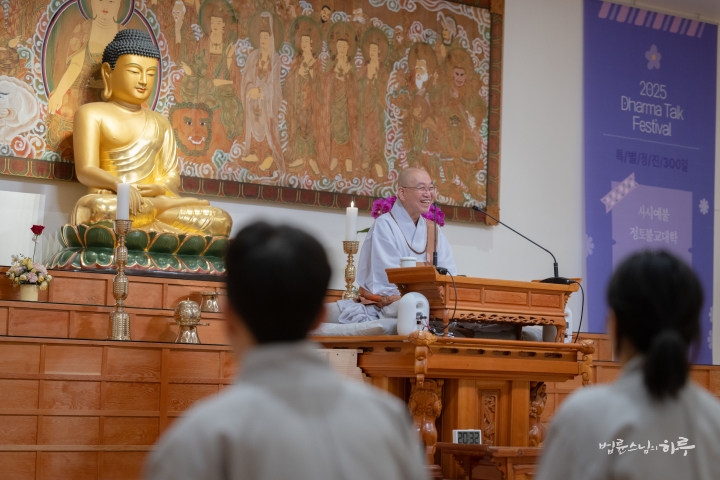
Life being long doesn’t mean it’s always filled with only good things. There are fights, suffering, and hatred, but there’s also joy. If life is short, wouldn’t it be such a waste to spend that brief time in suffering and hatred? When food is plentiful, you can eat only the delicious parts and leave the rest, but when food is scarce, you have to eat everything, including the peels, don’t you? Similarly, if it seems like your life span might be shortened, you should live the remaining time fully. When you accept death peacefully, you can actually live life more completely. This also helps with treatment. Since cancer is a type of mutation, excessive stress can accelerate its spread, while maintaining a peaceful mind can help slow it down.
There was once a person who worked hard, earned a lot of money, and became successful, but when he felt unwell and went to the hospital, he was diagnosed with cancer. After being told he had only one year to live, he decided to share the money he had accumulated with those around him. After giving everything away for a year, when he thought his time had come, surprisingly, his condition improved. This shows how much psychological factors affect cancer and how a positive mindset can help with treatment. So your positive thinking certainly helps. However, if your heart feels heavy, it means you haven’t fully accepted this reality yet. It would be better if you could accept it in your heart as well. In the past, there were times when the average human lifespan was only in the 40s. How old are you now?
“I’m 47 years old.”
“By old standards, you’ve already exceeded the average lifespan. Even if you were to die now, there wouldn’t be much to regret. Are you single?”
“Yes, I’m single.”
“There’s a reason I asked if you live alone. If you had been breastfeeding a baby or had physical contact with a spouse, you would likely have discovered the abnormal signs much earlier.”
“But in my case, even when the cancer was first discovered, it was already somewhat large, and it spread throughout my body in just six days, so it’s a bit different from typical cases.”
“The progression rate of cancer varies from person to person. It can spread rapidly or progress very slowly. Early detection is especially important for breast cancer. That’s why women living alone need to pay more attention to self-examination. Fortunately, since you’re alone, you don’t have to worry much about a spouse or children.”
“Yes, that’s right.”
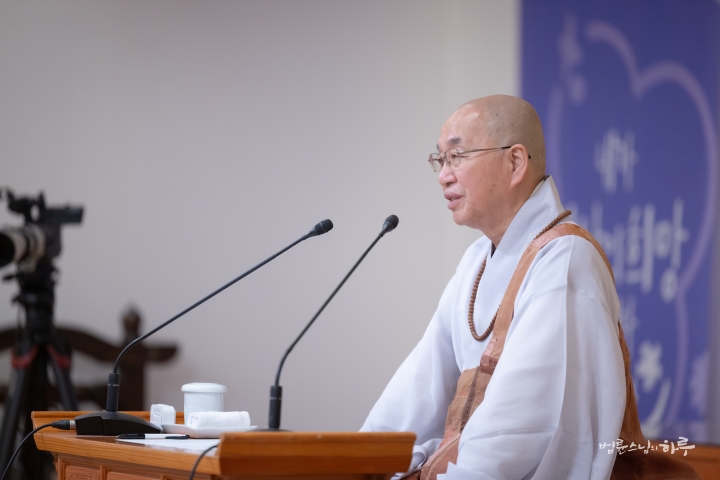
“Since you don’t have a husband or children, if you can calmly accept that ‘it’s actually fortunate that I’m alone,’ it will help with your treatment. I think your talking at length is an attempt to reduce anxiety and think positively. Positive thinking certainly helps. But what’s more important is releasing the tension in your mind. If your heart is fearful and sad, yet you forcefully suppress it and only think ‘It’s okay, everything will be fine,’ it won’t help much. Our body’s metabolism is controlled by the autonomic nervous system, which is affected when the mind is tense but functions smoothly when the mind is at ease. Most illnesses that modern people suffer from often stem from tension. Despite eating well, people’s health isn’t good, right? That’s why having a peaceful mind is most important.”
“I understand, Sunim.”
“That won’t be easy, will it? Because there’s attachment to life.”
“Yes, I’ll try to let go of my attachment to life. I’ll think more deeply about ways to maintain a peaceful mind.”
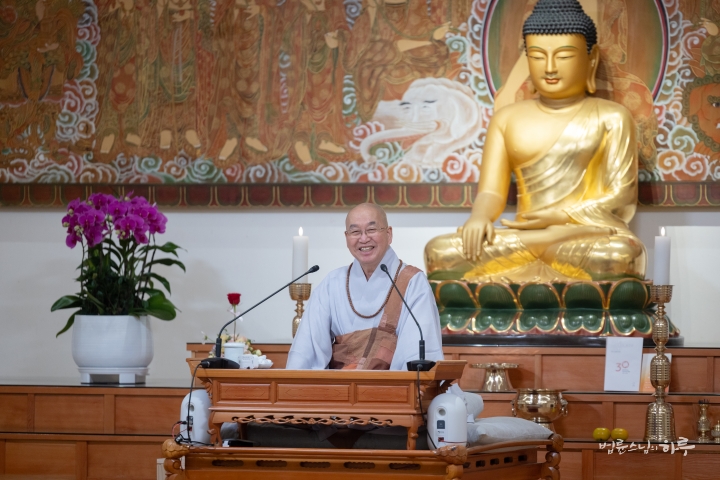
“No matter how much you think, your mind won’t become peaceful. It’s natural for you to think ‘I wish I could live a bit longer.’ But you’ve already lived enough, and you have sufficient conditions for treatment, don’t you? There are people who can’t receive treatment because they can’t afford hospital bills, and even those with money in countries like India can’t receive treatment due to lack of hospital facilities. In fact, there was a patient in India who kept asking me to help them get examined in Korea.
You currently have insurance and can afford treatment, right? Korean hospitals can be considered world-class when it comes to cancer treatment. You have the conditions for treatment, and since you’re not married and are alone, you’re in a position where it would be okay even if you died now. Dying young isn’t necessarily bad either. Your memorial photo will remain very youthful. If you live long, your memorial photo will be completely wrinkled, won’t it? It would look awkward if edited with Photoshop. You can think of this positively too. (laughs)
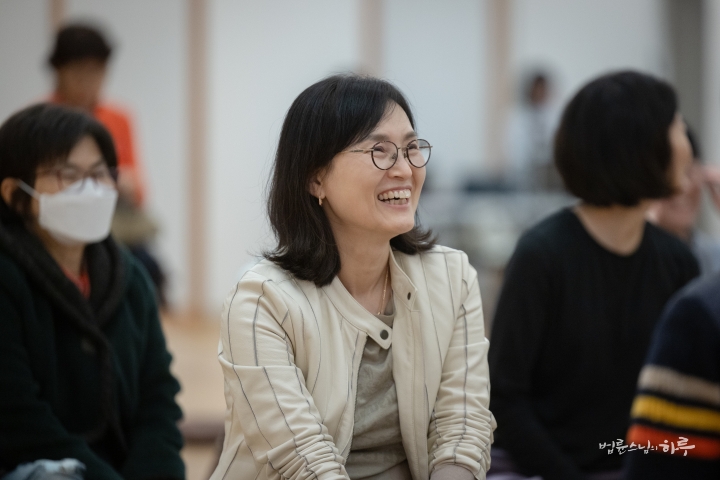
Since pain is unavoidable, you can take painkillers. Think positively and leave the treatment to the doctors. There isn’t much you can do directly. What you can do on your own is dietary therapy. Since food can affect cancer development, it’s good to eat foods that are easy to digest and light. There’s research showing that consuming too many nutrients can also help cancer cells grow. So eating small portions and natural foods can be helpful.
I don’t think going to expensive nursing homes that cost millions of won is particularly helpful. People struggle out of anxiety, but the actual effects are often minimal. Of course, cancer patients want to grasp at any straw, so I can’t unconditionally tell them not to do this. However, it is necessary to adjust your diet somewhat. It’s important to eat simply, receive treatment diligently, and use your time efficiently. You need to choose whether to live 20 years worrying or 10 years comfortably. I think living 10 years comfortably is better. When you have this mindset, you naturally relax and feel at ease without forcing yourself to think ‘I should be comfortable.’ And meditation within the limits of not straining your body can also be helpful. If you try too hard to meditate well, it actually becomes unhelpful.”
Questions continued to follow.
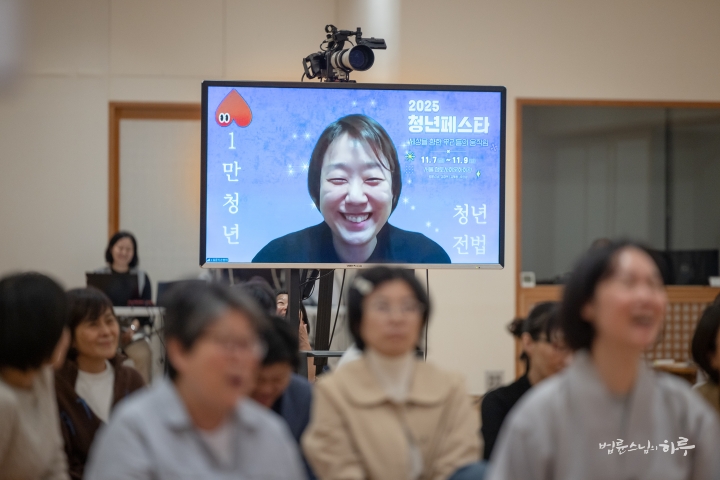
I manage my mind by thinking everything is ‘my fault,’ but is it okay to let things go like this regardless of the facts?
What does Sunim think about establishing new programs like children’s Dharma assemblies and youth Dharma assemblies at Jungto Society?
After our parents passed away, we put the house where my unmarried brother and disabled brother will live together under the unmarried brother’s name. What should we do when conflicts arise over property issues like this?
After finishing the dialogue, it was past 9 PM. After concluding the Dharma assembly with the Four Great Vows, the members of the Sangha sat in circles by group for mindful sharing.
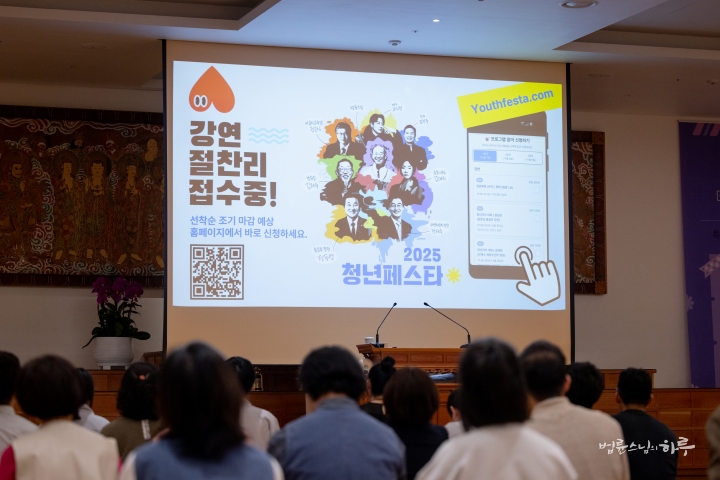
Tomorrow, Sunim will have an early morning breakfast meeting with North Korea experts at The Peace Foundation, meet with a social figure visiting The Peace Foundation for lunch, and in the afternoon, have a dialogue session with female INEB participants who are touring Jungto Society.





